 Libri di Sara Ahmed su Unilibro.it) Libri di Sara Ahmed su Unilibro.it)
|
|
2024 |
 Title :
Il manuale della femminista guastafeste
Title :
Il manuale della femminista guastafesteAuthor: Ahmed Sara Publisher: Fandango Libri Pieno di verità, massime ed equazioni femministe, strutturato in cinque capitoli, Il manuale della femminista guastafeste ci dimostra come essere una guastafeste possa aiutarci a navigare nel mondo e come "uccidere la gioia" possa essere un progetto radicale che crea il mondo. Presentando un'analisi acuta della letteratura, del cinema e delle opere femministe influenti e attingendo alle proprie esperienze come studiosa e attivista femminista queer di colore, Ahmed rivela e raccoglie le preziose lezioni di chi è arrivata prima di lei, recuperando e unendosi a un lignaggio di guastafeste nere e marroni, scrittrici come Alice Walker, bell hooks, Audre Lourde, Angela Davis e Claudia Rankine. € 20,00
Scontato: € 19,00
|
|
|
2023 |
 Title :
La promessa della felicità
Title :
La promessa della felicitàAuthor: Ahmed Sara Publisher: Luca Sossella Editore «La felicità è costantemente descritta come l'oggetto del desiderio umano, come ciò a cui ambiamo, ciò che dà scopo, significato e ordine alla vita umana. Ma anche se la felicità è quel che desideriamo, ciò non significa che sappiamo cosa desideriamo nel desiderare la felicità. La felicità potrebbe persino orchestrare il suo stesso desiderio. Oppure potrebbe mantenere il proprio posto come desiderio perché non può essere data. La felicità: un desiderio, una volontà, un bisogno. In questo libro mi domando cosa significa pensare alla felicità in questi termini. L'interrogativo che mi guida non è tanto "cos'è la felicità?", ma piuttosto "cosa fa la felicità?". Non avanzo una definizione di felicità, o un modello di felicità autentica. Né offro una serie di istruzioni su come raggiungerla: non ne ho da impartire e semmai scrivo da una posizione di scettica incredulità nei confronti della felicità come tecnica per vivere bene». € 16,00
Scontato: € 15,20
|
 Title :
Un'altra cena rovinata. Saggi scelti
Title :
Un'altra cena rovinata. Saggi sceltiAuthor: Ahmed Sara Publisher: Fandango Libri Sara Ahmed è nata in Gran Bretagna nel 1969 da padre pachistano e madre inglese. Subito dopo, la famiglia si è trasferita in Australia, dove Ahmed è cresciuta prima di tornare nel Regno Unito per completare il dottorato. È autrice di undici opere di saggistica, le prime delle quali sono un totem del postmodernismo femminista, della teoria dell'affetto e della fenomenologia queer. Il suo contributo più celebre è stato la figura della femminista guastafeste (killjoy), che è anche il titolo del suo popolare blog. Essere una femminista guastafeste è una questione di identificazione; è per lei, come scrive sul blog, "la mia filosofia e la mia politica". Dopo essere stata per 20 anni nell'Accademia come professoressa di Women Studies e successivamente di Race e Cultural Studies, si è dimessa accusando l'istituzione universitaria di essere un luogo di abusi a sfondo sessuale. Il suo gesto ha provocato dibattiti e discussioni creando quindi un movimento critico e di riforma verso l'accademia. Conoscere il pensiero intersezionale di Sara Ahmed significa entrare in un mondo dove il sessismo, il colonialismo, il razzismo e la violenza di genere vengono analizzati e decostruiti per garantire a tutte e tutti gli strumenti adeguati per riconoscerli e superarli. Con questa antologia sarà possibile avere un compendio delle sue opere più importanti, una piccola avanguardia per introdurre in Italia la sua filosofia ribelle e libertaria e per non ritrovarci più le "sole femministe al tavolo". € 22,00
Scontato: € 20,90
|
|
2022 |
 Title :
Vivere una vita femminista
Title :
Vivere una vita femministaAuthor: Ahmed Sara Publisher: Edizioni ETS Vivere una vita femminista in un mondo non femminista può essere faticoso, perché faticoso è lottare contro la violenza di un sistema che ci promette la felicità solo a patto di adeguarci ai suoi meccanismi. Intrecciando la sua narrazione con quella di altre femministe nere e of color prima di lei, Sara Ahmed ci offre una riflessione personale e politica sull'esperienza quotidiana di una vita dedicata a essere quella che chiama una killjoy femminista, una guastafeste, un'ammazzagioia. Vivere una vita come guastafeste femministe significa assumersi la fatica di abdicare alla normalità ed essere caparbiamente inopportune nel mettere in discussione l'orizzonte di felicità socialmente appropriato. Ahmed ci propone strategie di sopravvivenza affinché il femminismo possa continuare a esistere e a cambiare il mondo, ci sprona a coltivare l'insoddisfazione che ci spinge a creare "il mondo a cui aspiriamo", ci incita a svelare la violenza che si nasconde negli imperativi della norma, a trovare soluzioni creative agli ostacoli quotidiani e a creare reti di cura e supporto per continuare la lotta. Vivere una vita femminista è una riflessione teorica che si fa prassi: il libro mette a disposizione un manifesto e un kit di sopravvivenza per killjoy femministe, una sopravvivenza intesa come un progetto collettivo per mantenere in vita noi stesse e la nostra lotta. Perché, per sopravvivere, il femminismo ha bisogno delle femministe tanto quanto le femministe hanno bisogno del femminismo. Una vita femminista non è solo fatica, e prendersi cura di noi stesse è parte integrante della lotta: € 28,00
Scontato: € 26,60
|
|
|
1918 |
 Title :
Energy Storage at Different Voltage Levels
Title :
Energy Storage at Different Voltage LevelsAuthor: Zobaa Ahmed Faheem (EDT), Ribeiro Paulo F. (EDT), Aleem Shady H. E. Abdel (EDT), Afifi Sara N. (EDT) Publisher: Inst of Engineering & Technology € 138,60
|
 Title :
Composing Fisher Kernels from Deep Neural Models
Title :
Composing Fisher Kernels from Deep Neural ModelsAuthor: Azim Tayyaba, Ahmed Sarah Publisher: Baker & Taylor € 67,80
|
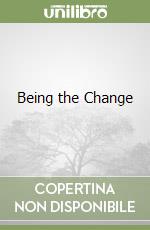 Title :
Being the Change
Title :
Being the ChangeAuthor: Ahmed Sara K., Roberts Terrence J. Ph.D. (FRW) Publisher: Heinemann € 27,10
|
|
1917 |
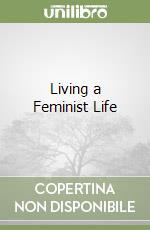 Title :
Living a Feminist Life
Title :
Living a Feminist LifeAuthor: Ahmed Sara Publisher: Duke Univ Pr € 96,80
|
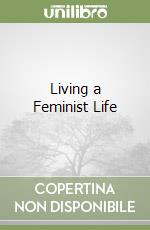 Title :
Living a Feminist Life
Title :
Living a Feminist LifeAuthor: Ahmed Sara Publisher: Duke Univ Pr € 26,20
|
|
1914 |
 Title :
Upstanders
Title :
UpstandersAuthor: Daniels Harvey, Ahmed Sara K. Publisher: Heinemann For all things Upstanders-including chapter-by-chapter sneak previews, blog posts from Smokey and Sara, videos of Sara's classroom and of them talking about the book, and more-visit Heinemann.com/Upstanders. How can we meet today's elevated academic goals and engage middle school kids-but not simply replicate our competitive, winner-take-all society? How can our students achieve an even higher standard-demonstrating the capacity and the commitment to bend the world toward justice? In a word, inquiry. Welcome to the classroom of Sara Ahmed. With Smokey Daniels as your guide you'll see exactly how Sara uses inquiry to turn required curricular topics into questions so fascinating that young adolescents can't resist investigating them. Units so engaging that they provide all the complexity the standards could ever expect, while helping students grow from bystanders to Upstanders. Smokey and Sara describe precisely how to create, manage, and sustain a classroom built around choice, small-group collaboration, and critical thinking. You'll be inspired by what Sara's students accomplish, but you'll also come away from Upstanders with a can-do plan for teaching your own classes thanks to:
What kind of classroom do we want for our middle schoolers? How about one that develops the skills the standards demand and prepares kids to take action in the world right now? We can do it-if we help kids become Upstanders. € 30,90
|
 Title :
Willful Subjects
Title :
Willful SubjectsAuthor: Ahmed Sara Publisher: Duke Univ Pr In Willful Subjects Sara Ahmed explores willfulness as a charge often made by some against others. One history of will is a history of attempts to eliminate willfulness from the will. Delving into philosophical and literary texts, Ahmed examines the relation between will and willfulness, ill will and good will, and the particular will and general will. Her reflections shed light on how will is embedded in a political and cultural landscape, how it is embodied, and how will and willfulness are socially mediated. Attentive to the wayward, the wandering, and the deviant, Ahmed considers how willfulness is taken up by those who have received its charge. Grounded in feminist, queer, and antiracist politics, her sui generis analysis of the willful subject, the figure who wills wrongly or wills too much, suggests that willfulness might be required to recover from the attempt at its elimination. € 26,20
|
 Title :
The Cultural Politics of Emotion
Title :
The Cultural Politics of EmotionAuthor: Ahmed Sara Publisher: Routledge Praise for the first edition "Ahmed's work contributes to cultural studies and rhetorical theory by elaborating a process through which we can approach everyday emotional practices as rich and complex sites interwoven in struggles for social change."--Rachel C. Riedner, JAC What do emotions do? How do emotions move us or get us stuck? In developing a theory of the cultural politics of emotion, Sara Ahmed focuses on the relationship between emotions, language, and bodies. She shows how emotions are named in speech acts, as well as how they involve sensations that can be felt not only emotionally, but physically. A new methodology for reading 'the emotionality of texts' is offered as are analyses of the role of emotions in debates on international terrorism, asylum and migration, and reconciliation and reparation. Attending to the intersections between race, gender, and sexuality, The Cultural Politics of Emotion is in dialogue with key trends in gender studies and cultural studies, the psychology and sociology of emotions, and phenomenology and psychoanalysis. It takes as its point of entry different emotions -- pain, hate, fear, disgust, shame, and love -- and reflects on the role of emotions in feminist and queer politics. In a special afterword to this tenth anniversary edition, Ahmed explains to readers how this classic book relates to other key works in the emergent field of affect studies and also reflects on the way the book has been part of her own intellectual trajectory. € 49,60
|
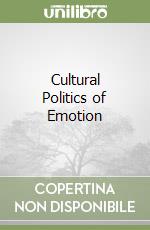 Title :
Cultural Politics of Emotion
Title :
Cultural Politics of EmotionAuthor: Sara Ahmed Publisher: EDINBURGH UNIVERSITY PRESS € 29,40
|
||
|
1913 |
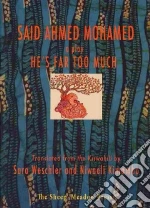 Title :
He's Far Too Much
Title :
He's Far Too MuchAuthor: Mohamed Said Ahmed, Weschler Sara (TRN), Kimambo Niwaeli (TRN) Publisher: Sheep Meadow Pr € 17,60
|
|
|
1912 |
 Title :
On Being Included
Title :
On Being IncludedAuthor: Ahmed Sara Publisher: Duke Univ Pr What does diversity do? What are we doing when we use the language of diversity? Sara Ahmed offers an account of the diversity world based on interviews with diversity practitioners in higher education, as well as her own experience of doing diversity work. Diversity is an ordinary, even unremarkable, feature of institutional life. And yet, diversity practitioners often experience institutions as resistant to their work, as captured through their use of the metaphor of the “brick wall.” On Being Included offers an explanation of this apparent paradox. It explores the gap between symbolic commitments to diversity and the experience of those who embody diversity. Commitments to diversity are understood as "non-performatives" that do not bring about what they name. The book provides an account of institutional whiteness and shows how racism can be obscured by the institutionalization of diversity. Diversity is used as evidence that institutions do not have a problem with racism. On Being Included offers a critique of what happens when diversity is offered as a solution. It also shows how diversity workers generate knowledge of institutions in attempting to transform them. € 85,70
|
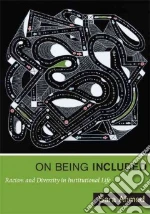 Title :
On Being Included
Title :
On Being IncludedAuthor: Ahmed Sara Publisher: Duke Univ Pr What does diversity do? What are we doing when we use the language of diversity? Sara Ahmed offers an account of the diversity world based on interviews with diversity practitioners in higher education, as well as her own experience of doing diversity work. Diversity is an ordinary, even unremarkable, feature of institutional life. And yet, diversity practitioners often experience institutions as resistant to their work, as captured through their use of the metaphor of the “brick wall.” On Being Included offers an explanation of this apparent paradox. It explores the gap between symbolic commitments to diversity and the experience of those who embody diversity. Commitments to diversity are understood as "non-performatives" that do not bring about what they name. The book provides an account of institutional whiteness and shows how racism can be obscured by the institutionalization of diversity. Diversity is used as evidence that institutions do not have a problem with racism. On Being Included offers a critique of what happens when diversity is offered as a solution. It also shows how diversity workers generate knowledge of institutions in attempting to transform them. € 25,10
|
|
1910 |
 Title :
The Promise of Happiness
Title :
The Promise of HappinessAuthor: Ahmed Sara Publisher: Duke Univ Pr The Promise of Happiness is a provocative cultural critique of the imperative to be happy. It asks what follows when we make our desires and even our own happiness conditional on the happiness of others: “I just want you to be happy”; “I'm happy if you're happy.” Combining philosophy and feminist cultural studies, Sara Ahmed reveals the affective and moral work performed by the “happiness duty,” the expectation that we will be made happy by taking part in that which is deemed good, and that by being happy ourselves, we will make others happy. Ahmed maintains that happiness is a promise that directs us toward certain life choices and away from others. Happiness is promised to those willing to live their lives in the right way. Ahmed draws on the intellectual history of happiness, from classical accounts of ethics as the good life, through seventeenth-century writings on affect and the passions, eighteenth-century debates on virtue and education, and nineteenth-century utilitarianism. She engages with feminist, antiracist, and queer critics who have shown how happiness is used to justify social oppression, and how challenging oppression causes unhappiness. Reading novels and films including Mrs. Dalloway, The Well of Loneliness, Bend It Like Beckham, and Children of Men, Ahmed considers the plight of the figures who challenge and are challenged by the attribution of happiness to particular objects or social ideals: the feminist killjoy, the unhappy queer, the angry black woman, and the melancholic migrant. Through her readings she raises critical questions about the moral order imposed by the injunction to be happy. € 94,60
|
 Title :
The Promise of Happiness
Title :
The Promise of HappinessAuthor: Ahmed Sara Publisher: Duke Univ Pr The Promise of Happiness is a provocative cultural critique of the imperative to be happy. It asks what follows when we make our desires and even our own happiness conditional on the happiness of others: “I just want you to be happy”; “I'm happy if you're happy.” Combining philosophy and feminist cultural studies, Sara Ahmed reveals the affective and moral work performed by the “happiness duty,” the expectation that we will be made happy by taking part in that which is deemed good, and that by being happy ourselves, we will make others happy. Ahmed maintains that happiness is a promise that directs us toward certain life choices and away from others. Happiness is promised to those willing to live their lives in the right way. Ahmed draws on the intellectual history of happiness, from classical accounts of ethics as the good life, through seventeenth-century writings on affect and the passions, eighteenth-century debates on virtue and education, and nineteenth-century utilitarianism. She engages with feminist, antiracist, and queer critics who have shown how happiness is used to justify social oppression, and how challenging oppression causes unhappiness. Reading novels and films including Mrs. Dalloway, The Well of Loneliness, Bend It Like Beckham, and Children of Men, Ahmed considers the plight of the figures who challenge and are challenged by the attribution of happiness to particular objects or social ideals: the feminist killjoy, the unhappy queer, the angry black woman, and the melancholic migrant. Through her readings she raises critical questions about the moral order imposed by the injunction to be happy. € 26,20
|
|
2006 |
 Title :
Queer Phenomenology
Title :
Queer PhenomenologyAuthor: Ahmed Sara Publisher: Duke Univ Pr In this groundbreaking work, Sara Ahmed demonstrates how queer studies can put phenomenology to productive use. Focusing on the “orientation” aspect of “sexual orientation” and the “orient” in “orientalism,” Ahmed examines what it means for bodies to be situated in space and time. Bodies take shape as they move through the world directing themselves toward or away from objects and others. Being “orientated” means feeling at home, knowing where one stands, or having certain objects within reach. Orientations affect what is proximate to the body or what can be reached. A queer phenomenology, Ahmed contends, reveals how social relations are arranged spatially, how queerness disrupts and reorders these relations by not following the accepted paths, and how a politics of disorientation puts other objects within reach, those that might, at first glance, seem awry. Ahmed proposes that a queer phenomenology might investigate not only how the concept of orientation is informed by phenomenology but also the orientation of phenomenology itself. Thus she reflects on the significance of the objects that appear—and those that do not—as signs of orientation in classic phenomenological texts such as Husserl's Ideas. In developing a queer model of orientations, she combines readings of phenomenological texts—by Husserl, Heidegger, Merleau-Ponty, and Fanon—with insights drawn from queer studies, feminist theory, critical race theory, Marxism, and psychoanalysis. Queer Phenomenology points queer theory in bold new directions. € 24,30
|
 Title :
Queer Phenomenology
Title :
Queer PhenomenologyAuthor: Ahmed Sara Publisher: Duke Univ Pr In this groundbreaking work, Sara Ahmed demonstrates how queer studies can put phenomenology to productive use. Focusing on the “orientation” aspect of “sexual orientation” and the “orient” in “orientalism,” Ahmed examines what it means for bodies to be situated in space and time. Bodies take shape as they move through the world directing themselves toward or away from objects and others. Being “orientated” means feeling at home, knowing where one stands, or having certain objects within reach. Orientations affect what is proximate to the body or what can be reached. A queer phenomenology, Ahmed contends, reveals how social relations are arranged spatially, how queerness disrupts and reorders these relations by not following the accepted paths, and how a politics of disorientation puts other objects within reach, those that might, at first glance, seem awry. Ahmed proposes that a queer phenomenology might investigate not only how the concept of orientation is informed by phenomenology but also the orientation of phenomenology itself. Thus she reflects on the significance of the objects that appear—and those that do not—as signs of orientation in classic phenomenological texts such as Husserl's Ideas. In developing a queer model of orientations, she combines readings of phenomenological texts—by Husserl, Heidegger, Merleau-Ponty, and Fanon—with insights drawn from queer studies, feminist theory, critical race theory, Marxism, and psychoanalysis. Queer Phenomenology points queer theory in bold new directions. € 89,90
|
|
2004 |
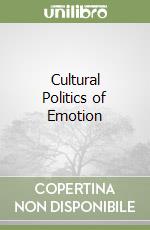 Title :
Cultural Politics of Emotion
Title :
Cultural Politics of EmotionAuthor: Sara Ahmed Publisher: EDINBURGH UNIVERSITY PRESS € 36,50
|
|
|
2003 |
 Title :
Uprootings/Regroundings
Title :
Uprootings/RegroundingsAuthor: Ahmed Sara (EDT), Castaneda Claudia (EDT), Fortier Anne-Marie (EDT), Sheller Mimi (EDT) Publisher: Palgrave Macmillan What is the relationship between leaving home and the imagining of home itself? And having left home, what might it mean to return? How can we re-think what it means to be grounded, or to stay put? Who moves and who stays? What interaction is there between those who stay and those who arrive and leave? Focusing on differences of race, gender, class and sexuality, the contributors reveal how the movements of bodies and communities are intrinsic to the making of homes, nations, identities and boundaries. They reflect on the different experiences of being at home, leaving home, and going home. They also explore ways in which attachment to place and locality can be secured--as well as challenged--through the movements that make up our dwelling places. € 28,40
|
|
|
2000 |
 Title :
Strange Encounters
Title :
Strange EncountersAuthor: Ahmed Sara Publisher: Routledge Examining the relationship between strangers, embodiment and community, Strange Encounters challenges the assumptions that the stranger is simply anybody we do not recognize and instead proposes that he or she is socially constructued as somebody we already know. Using feminist and postcolonial theory this book examines the impact of multiculturalism and globalization on embodiment and community whilst considering the ethical and political implication of its critique for post-colonial feminism. A diverse range of texts are analyzed which produce the figure of 'the stranger', showing that it has alternatively been expelled as the origin of danger - such as in neighbourhood watch, or celebrated as the origin of difference - as in multiculturalism. The author argues that both of these standpoints are problematic as they involve 'stranger fetishism'; they assume that the stranger 'has a life of its own'. € 193,90
|
 Title :
Strange Encounters
Title :
Strange EncountersAuthor: Ahmed Sara Publisher: Routledge Examining the relationship between strangers, embodiment and community, Strange Encounters challenges the assumptions that the stranger is simply anybody we do not recognize and instead proposes that he or she is socially constructued as somebody we already know. Using feminist and postcolonial theory this book examines the impact of multiculturalism and globalization on embodiment and community whilst considering the ethical and political implication of its critique for post-colonial feminism. A diverse range of texts are analyzed which produce the figure of 'the stranger', showing that it has alternatively been expelled as the origin of danger - such as in neighbourhood watch, or celebrated as the origin of difference - as in multiculturalism. The author argues that both of these standpoints are problematic as they involve 'stranger fetishism'; they assume that the stranger 'has a life of its own'. € 67,30
|
|
1999 |
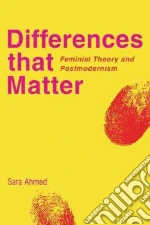 Title :
Differences That Matter
Title :
Differences That MatterAuthor: Ahmed Sara Publisher: Cambridge Univ Pr Differences That Matter challenges theories of the relationship between feminism and postmodernism that ask "is/should feminism be modern or postmodern?" Pointing out how postmodernism has been allowed to dictate feminist debates, Sara Ahmed argues instead that feminism must itself ask questions of postmodernism; that feminist theorists speak (back) to postmodernism rather than simply speak on (their relationship to) it. This "speaking back" involves a refusal to position postmodernism as a generalizable condition of the world, using close readings of postmodern constructions of rights, ethics, "woman," subjectivity, authorship and film. € 27,10
|
|
|
1998 |
 Title :
Differences That Matter
Title :
Differences That MatterAuthor: Sara Ahmed Publisher: BERTRAMS PRINT ON DEMAND Differences That Matter challenges theories of the relationship between feminism and postmodernism that ask "is/should feminism be modern or postmodern?" Pointing out how postmodernism has been allowed to dictate feminist debates, Sara Ahmed argues instead that feminism must itself ask questions of postmodernism; that feminist theorists speak (back) to postmodernism rather than simply speak on (their relationship to) it. This "speaking back" involves a refusal to position postmodernism as a generalizable condition of the world, using close readings of postmodern constructions of rights, ethics, "woman," subjectivity, authorship and film. € 110,30
|
|